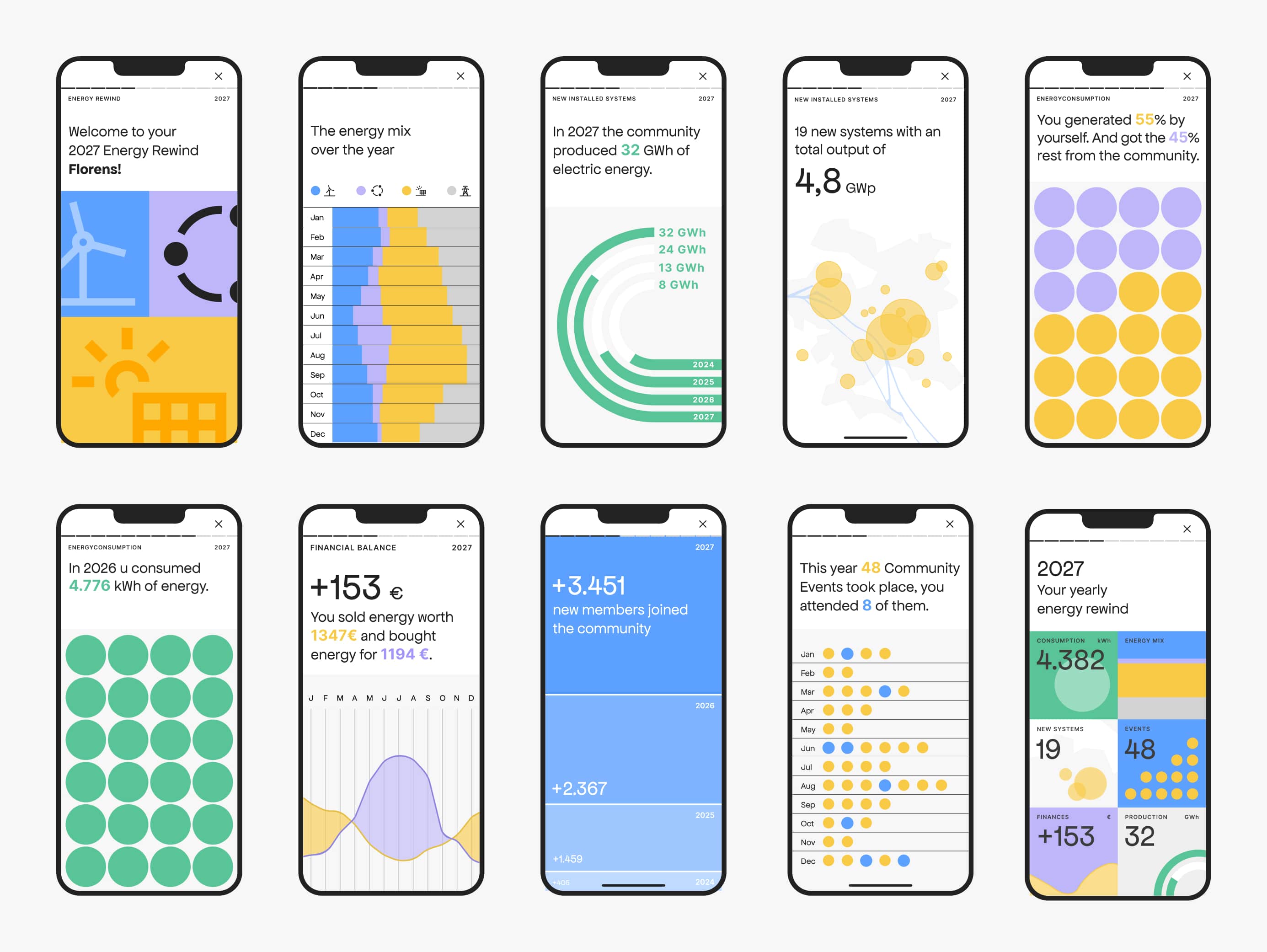Co:nnect - where energy meets community
Project info
Time: 3 Month
Team: Tobias Ertel, Pius Burkhart, Florens Schwendowius
Type: Bachelor thesis
Supervisor: Prof. Benedikt Groß, Prof. David Oswald
Year: 2023
A digital platform for a simplified participation in the energy transition
In the context of our bachelor thesis, we addressed the question of how citizens can be more involved in the development of renewable energies and how they can benefit even more from it. For this purpose, we developed a digital platform for energy communities, with which the regional energy transition towards renewable energies can be promoted quickly and easily by citizens.

Members of these communities can use the new interface to invest directly in renewable energies and thus finance cheap and green electricity for the the citizen organized power grid. Due to the strong fluctuation in electricity production from renewable energies and the changing demand, the electricity price in the energy community is also flexible and changes every quarter of an hour. The app provides all important data on the flexible electricity price as well as on electricity consumption and the energy community at a glance. It also gives its users the opportunity to participate in the community through polls and events.
As part of the European Union's Energy Communities Repository, the platform could also serve as a digital blueprint. The app could make energy communities more attractive and promote a decentralized energy transition.
Our project aims to show how energy sharing can function in the future in the so-called energy community in a locally delimited power grid.
Prototype
Click through and discover the app.
Relevance
Climate change and the energy crisis are confronting our society with new challenges in terms of energy supply. In order to become less dependent on energy imports from abroad and large power companies, and at the same time to accelerate the expansion of renewable energies, a decentralized energy turnaround in the hands of citizens is needed.
Problem
There are no incentives for a rapid expansion of renewable energies at the regional level, because electricity from photovoltaics and wind farms from our doorstep is more expensive than electricity from a fossil fuel power station far away. This is partly due to the fact that energy is organized centrally by large energy companies. In addition, there are high entry and participation hurdles for citizens. Citizens could finance 35 percent of the federal government's expansion target by 2030. The consent of the entire civilian community is also needed to implement a rapid expansion.
Energy Sharing
Energy sharing is a local and participatory energy concept that allows members of renewable energy communities to directly purchase the green electricity generated by community-financed facilities. These communities can make an important contribution to accelerating the energy transition. This has also been realized by the European Union, which already issued a directive (RED-II) in 2018 to facilitate energy sharing. According to this directive, all EU member states are to put the political framework conditions for energy sharing in place by 2021.
Although citizen have successfully joined together to a community, and have successfully financed and operated plants, they can not directly use the locally produced green electricity. The community produced electricity can therefore not be consumed directly, but must be fed into the power grid for a legally defined rate. In concrete terms, this means that the cooperative receives about 6-9 ct per kWh fed into the grid. This may be enough to refinance the plants and generate a return, but it still does not correspond to the market value of the electricity. At the same time, the members of the cooperative have to buy electricity from the grid at normal rates (40 ct kWh). With a new directive of the EU this is about to change. The European Union will make Energy Sharing in Germany possible soon.
The aim of energy sharing is to enable citizens not only to generate renewable electricity jointly, but also to use it jointly. This makes electricity from regional community plants cheaper than electricity from large electricity suppliers.
User interface
Particularly important for the community is the flexible electricity price. Towards the evening, for example, the proportion of solar energy becomes significantly lower and electricity tends to become more expensive. That’s why the electricity mix and price changes permanently throughout the day. This creates incentives to consume the electricity in times when it is generated locally. Community members are trying to shift the electricity use to times when the community generates its own power. Therefore they use the preview area to find out how the price of electricity will develop in the next hours based on weather data. This allows to use the electricity when it is at the cheapest. That saves the members a lot of money.
In the area "My Energy" they can see their power consumption and also have the possibility to track from which energy sources they have drawn power. For members who own a photovoltaik system themselves, the area „My Electricity“ looks a little different.
Since the European Union wants to make this scenario possible, it has launched the Energy Communities Repository in 2022. Every year, members of the community receive a review of the past year. This includes data visualizations, some of which relate to the entire community and some of which are specific to the member. This function is intended to help users better understand their energy consumption habits and motivate them to change their own behavior. The simply presented values give users a basis to compare themselves and make progress visible within the community. This resource offers professional and technical support for the founding and operation of energy communities. Like other digital solutions in the Energy Communities Repository, the platform we have designed could be realized with EU funding and made available in the Repository for Energy Communities throughout Europe.
Your year in Energy
